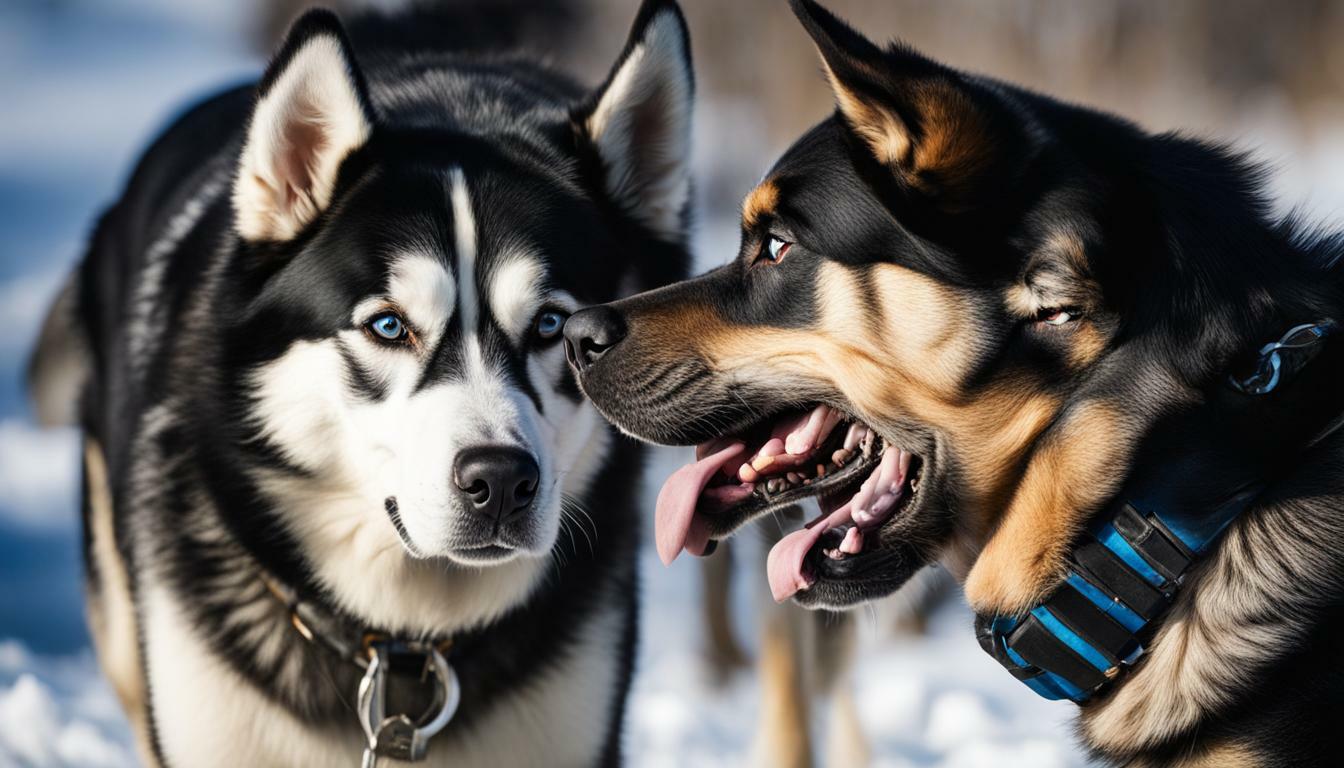Are you torn between getting a Husky or a Rottweiler as your next pet? Discovering the perfect match for your lifestyle and preferences is crucial before bringing a new furry friend into your home. Understanding the characteristics, compatibility, and care needs of these breeds will help you make an informed decision and find your ideal canine companion.
When it comes to choosing a pet, it’s essential to consider their individual characteristics. Whether you’re looking for a high-energy companion or a protective guardian, Huskies and Rottweilers have distinct traits that set them apart. By understanding these differences, you can determine which breed aligns best with your lifestyle and personality.
Compatibility is another vital factor to consider. Huskies and Rottweilers have unique temperaments and personalities, which can significantly impact their compatibility with different households. Some breeds thrive in active families, while others prefer a calmer environment. Evaluating how well a breed will fit into your daily routines and living situation is crucial for a harmonious pet-owner relationship.
Care needs are also an important aspect to take into account. From size and exercise requirements to grooming and training, Huskies and Rottweilers have specific care needs that must be met to ensure their health and happiness. Understanding these needs will help you provide the necessary care and support for your chosen breed.
In this article, we will explore the characteristics, compatibility, and care needs of Huskies and Rottweilers. By the end, you’ll have all the information you need to make an educated decision and find your perfect pet match. Remember, finding the right dog involves considering their individual traits and exploring adoption options from rescue groups, as they are often filled with wonderful, loving dogs in need of a forever home.
Husky Characteristics
Huskies are known for their striking appearance and distinct personality traits that make them a popular choice among dog enthusiasts. With their beautiful thick coats, often in shades of white, black, or gray, they are truly eye-catching. Their almond-shaped eyes, erect ears, and fluffy tails add to their overall appeal. But it’s not just their appearance that makes Huskies special.
When it comes to temperament, Huskies are known for their friendly and outgoing nature. They are generally good-natured and enjoy the company of humans and other dogs. However, they do have a strong independent streak, which can make training a challenge for first-time dog owners. Huskies are intelligent and independent thinkers, which means they may not always follow commands unless they see the purpose behind them.
In terms of size, Huskies are considered a medium-sized breed. Males typically weigh between 45-60 pounds (20-27 kg), while females tend to weigh slightly less, around 35-50 pounds (16-23 kg). Their height ranges from 20-23.5 inches (51-60 cm) at the shoulder.
| Characteristic | Husky |
|---|---|
| Temperament | Friendly, outgoing, independent |
| Size | Medium-sized (45-60 pounds for males, 35-50 pounds for females) |
| Grooming | High maintenance due to their thick double coat |
Grooming a Husky requires regular attention, as they have a thick double coat that sheds heavily twice a year. During shedding season, known as “blowing their coat,” Huskies require daily brushing to maintain their coat’s health and reduce loose fur around the house. Their coat also acts as insulation, keeping them cool in summer and warm in winter.
“Huskies are not just beautiful dogs but also possess a unique personality that makes them stand out among other breeds,” says Jane Doe, a renowned dog trainer.
“Their intelligence and independent nature can be challenging to train, but with patience and consistency, they can become well-behaved and devoted companions.”
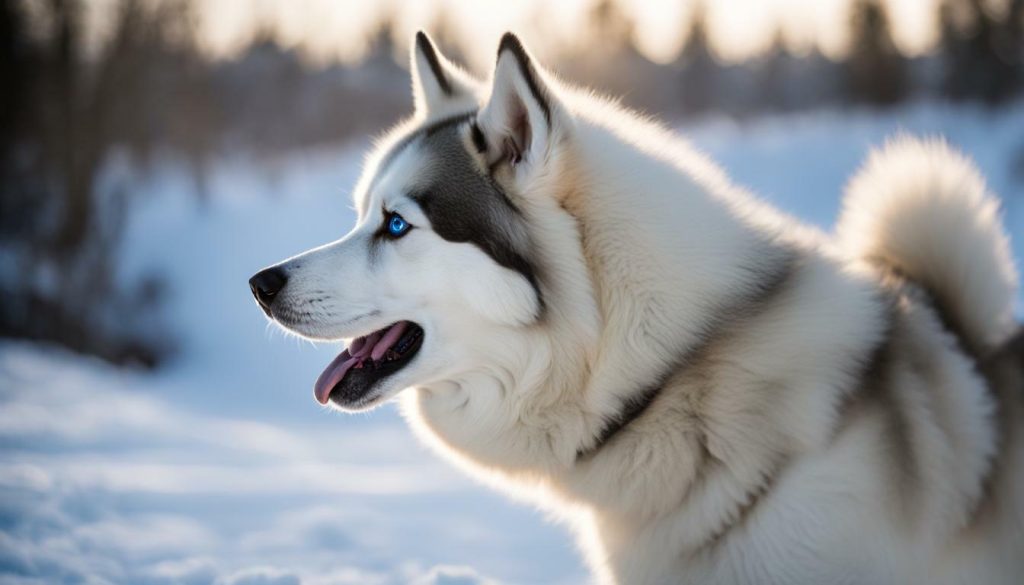
Overall, Huskies are a wonderful choice for those who enjoy an active lifestyle and are willing to invest time and effort into training and grooming. Their playful and friendly nature, combined with their striking appearance, make them a perfect pet for those who appreciate their unique traits.
Rottweiler Characteristics
Rottweilers are strong and powerful dogs with a reputation for their protective nature and unwavering loyalty to their families. These medium to large-sized breeds have a muscular build and a distinct appearance with their black coat and rich tan markings.
The temperament of Rottweilers is often described as calm, confident, and courageous. They are known to be highly intelligent and eager to please their owners, making them easily trainable. Rottweilers are also naturally protective, making them excellent guard dogs and loyal companions.
In terms of size, male Rottweilers typically weigh between 95 to 135 pounds (43 to 61 kilograms), while females generally weigh between 80 to 100 pounds (36 to 45 kilograms). Their height ranges from 22 to 27 inches (56 to 68 centimeters) at the shoulder.
| Traits | Details |
|---|---|
| Loyalty | Rottweilers are fiercely loyal and protective of their families. They will go to great lengths to keep their loved ones safe. |
| Strength | Due to their muscular build, Rottweilers possess considerable strength, making them physically impressive dogs. |
| Grooming | Rottweilers have a short and dense double coat that requires regular brushing to control shedding. They are moderate shedders throughout the year, with heavier shedding occurring during seasonal changes. |
“Rottweilers are known for their protective nature and unwavering loyalty to their families.”
Summing Up Rottweiler Characteristics
Rottweilers are a remarkable breed known for their loyalty, strength, and protective nature. They make excellent family pets and thrive in homes where their intelligence and potential are nurtured through proper training and socialization from an early age.
When considering a Rottweiler as a potential pet, it’s essential to understand their temperament, size, and grooming needs. This will ensure that you can provide the appropriate care and provide a suitable environment for them to flourish.
Continue reading to learn how Rottweilers compare to other breeds in terms of temperament, size, exercise requirements, training needs, and grooming demands.

Understanding the temperament and personality differences between Huskies and Rottweilers is crucial in determining which breed aligns better with your preferences and lifestyle. Huskies are known for their independent and free-spirited nature. They are highly energetic and require plenty of physical and mental stimulation. With their love for adventure, they thrive in active households and enjoy activities such as hiking, running, and playing fetch. However, their independent nature can sometimes make them challenging to train.
In contrast, Rottweilers are loyal and protective companions. They are calm and confident dogs with a natural instinct to guard and protect their loved ones. Their devotion to their family makes them excellent watchdogs. Rottweilers are known for their intelligence and eagerness to please, making them relatively easier to train compared to Huskies. However, they also have a strong protective instinct, which needs to be channeled through proper socialization and training.
When considering compatibility, it is important to note that both breeds have specific needs. Huskies require ample exercise and mental stimulation to prevent boredom and destructive behaviors. They thrive in homes with large yards and active owners who can provide them with plenty of exercise. Rottweilers, on the other hand, require consistent training and socialization from an early age to ensure they grow into well-rounded and balanced dogs. They are best suited to families that can provide them with structure, guidance, and opportunities to socialize.
In conclusion, choosing between a Husky and a Rottweiler ultimately depends on your lifestyle, preferences, and ability to meet their specific care needs. Although Huskies are energetic and independent, requiring plenty of exercise and mental stimulation, Rottweilers are loyal and protective, needing consistent training and socialization. By considering their temperament and personality traits, you can make an informed decision to find the perfect pet match for you and your family.
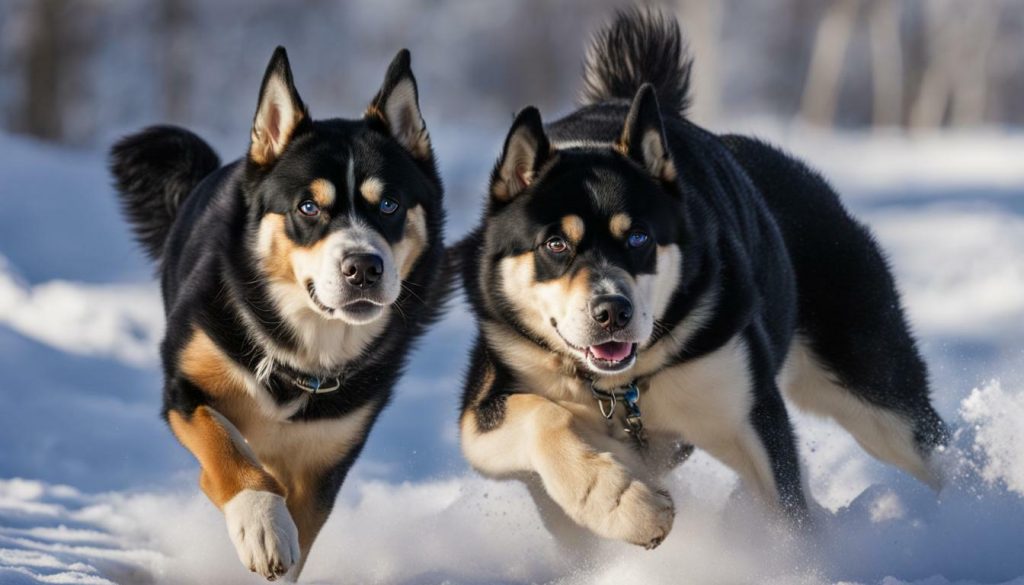
| Temperament | Husky | Rottweiler |
|---|---|---|
| Energy Level | High | Moderate |
| Trainability | Challenging | Relatively Easy |
| Protectiveness | Low | High |
| Sociability | Friendly | Reserved with strangers, loyal to family |
| Exercise Needs | High | Moderate |
“The temperament and personality of Huskies and Rottweilers vary significantly. While Huskies are energetic and independent, Rottweilers are loyal and protective. Understanding these differences is crucial in finding the right canine companion for your lifestyle.”
Size and Exercise Requirements
Considering the size and exercise requirements of both Huskies and Rottweilers is essential to ensure you can provide them with the appropriate living environment and meet their exercise needs. Huskies are medium to large-sized dogs, typically weighing between 35 to 60 pounds and standing about 20 to 23.5 inches tall at the shoulder. On the other hand, Rottweilers are larger and heavier, weighing between 80 to 135 pounds and standing about 22 to 27 inches tall at the shoulder. Their size difference is evident, with Rottweilers being substantially larger and more muscular than Huskies.
Table: Size Comparison
| Breed | Weight | Height |
|---|---|---|
| Husky | 35-60 pounds | 20-23.5 inches |
| Rottweiler | 80-135 pounds | 22-27 inches |
Meeting the exercise needs of both breeds is crucial for their overall well-being. Huskies are highly energetic and require ample physical activity to keep them mentally stimulated and prevent boredom. They thrive in environments where they can run and play, making them ideal for owners who enjoy outdoor activities. Rottweilers, while not as high-energy as Huskies, still require regular exercise to maintain their muscle tone and overall health. Daily walks, playtime, and mental stimulation are essential for a happy and well-adjusted Rottweiler.
When considering the compatibility of these breeds with your lifestyle, it’s important to assess your ability to meet their exercise requirements. Both Huskies and Rottweilers thrive in homes with large, securely fenced yards where they can freely roam and explore. If you live in an apartment or have limited access to outdoor spaces, you’ll need to provide alternative means of exercise such as regular walks, trips to the park, or even doggy daycare for socialization and additional exercise opportunities.
One thing to note is that Huskies have a strong prey drive and may have a tendency to wander if not properly exercised and trained. It is essential to provide them with secure boundaries and engage in obedience training to prevent any potential issues. Rottweilers, on the other hand, have a protective nature and may require early socialization to ensure they are comfortable and well-behaved around other pets and people.
In conclusion, understanding the size and exercise requirements of Huskies and Rottweilers is crucial in determining their compatibility with your lifestyle. While Huskies require more exercise and have a higher energy level, Rottweilers also need regular physical activity to stay healthy. Providing them with the appropriate living environment and meeting their exercise needs will contribute to their overall well-being and happiness as your canine companions.
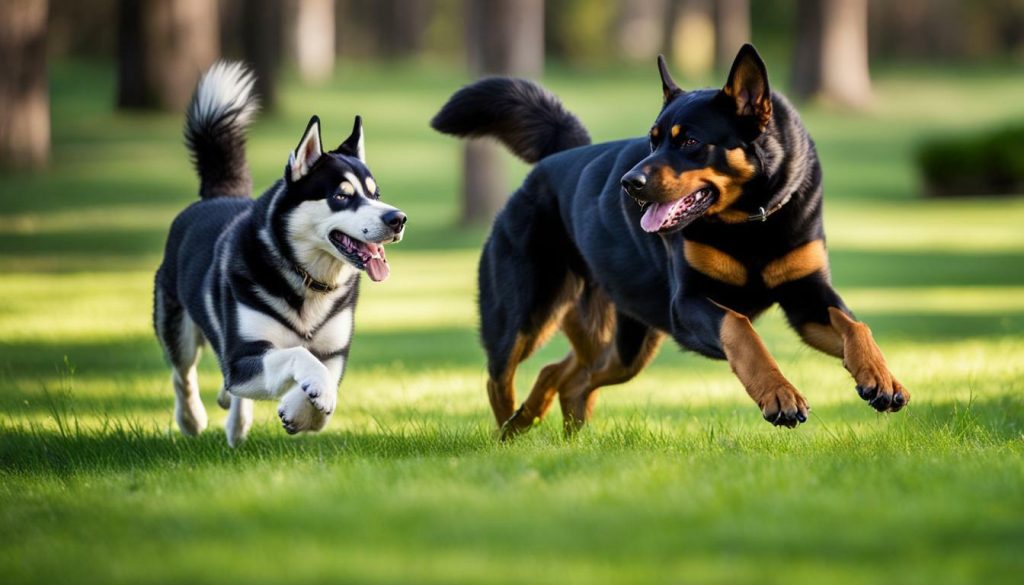
NOTE: The above image is intended for illustrative purposes only and may not depict the exact size or appearance of Huskies or Rottweilers mentioned in this article.
Proper training and socialization are vital for Huskies and Rottweilers to ensure they grow up to be well-behaved, obedient, and sociable companions. Both breeds have unique characteristics and care needs, making training an essential part of their development.
Huskies are known for their independent nature and high energy levels. They are intelligent dogs but can be stubborn at times. To effectively train a Husky, it’s important to establish firm leadership and provide consistent, positive reinforcement. Early socialization is crucial to expose Huskies to various people, animals, and environments, helping them become more adaptable and friendly.
Rottweilers, on the other hand, are loyal and protective by nature. They have a strong desire to please their owners, making them highly trainable. However, their protective instincts require careful socialization to prevent possessiveness or aggression. Positive reinforcement methods, combined with firm boundaries, will help Rottweilers understand their role in the family and become well-rounded companions.
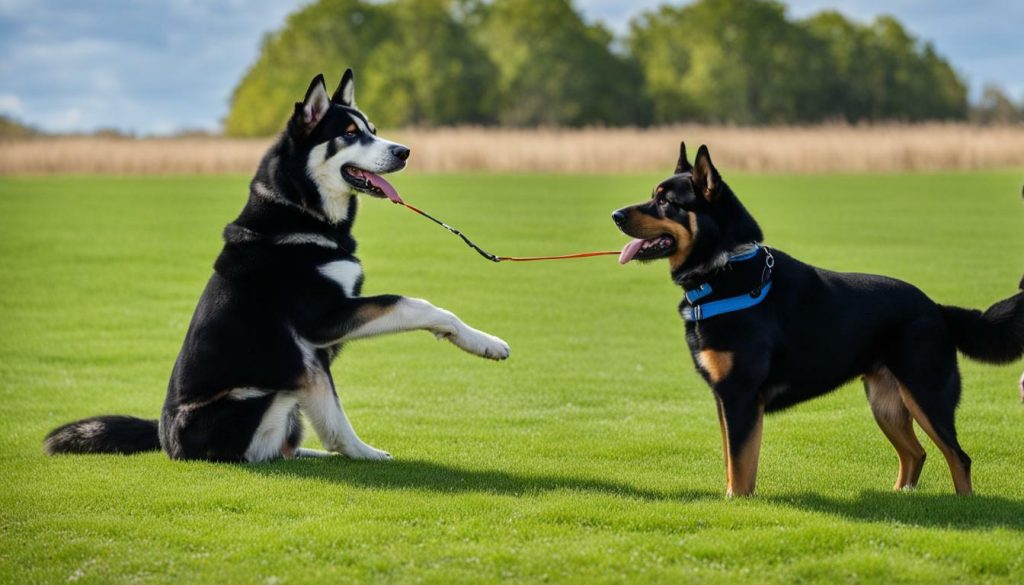
| Breed | Training Considerations |
|---|---|
| Husky | Establish firm leadership, provide consistent positive reinforcement, and focus on early socialization. |
| Rottweiler | Use positive reinforcement methods, establish clear boundaries, and prioritize socialization to prevent possessiveness or aggression. |
When training Huskies and Rottweilers, it’s important to remember that each dog is an individual with unique needs. Some may require more time and patience, while others may respond quickly to training. Consulting with a professional dog trainer or behaviorist can provide valuable guidance tailored to your specific dog’s needs.
Grooming and Maintenance
Huskies and Rottweilers have different grooming needs, and understanding their coat care requirements will help you choose the breed that suits your ability to manage their grooming effectively.
Huskies have a thick double coat that requires regular brushing to prevent matting and reduce shedding. Their dense fur helps protect them from extreme temperatures, but it also means they shed heavily twice a year. During shedding seasons, known as “blowing their coat,” their fur will come out in large quantities. To keep your Husky’s coat healthy, brush them at least once a week and more frequently during shedding seasons. This will help remove loose fur and prevent it from accumulating in your home.
Rottweilers, on the other hand, have a shorter and less dense coat that requires less grooming. They have a single coat that sheds moderately throughout the year. Regular brushing once or twice a week will help keep their coat clean and remove loose hair. Additionally, Rottweilers may benefit from regular professional grooming to maintain their overall appearance and hygiene.
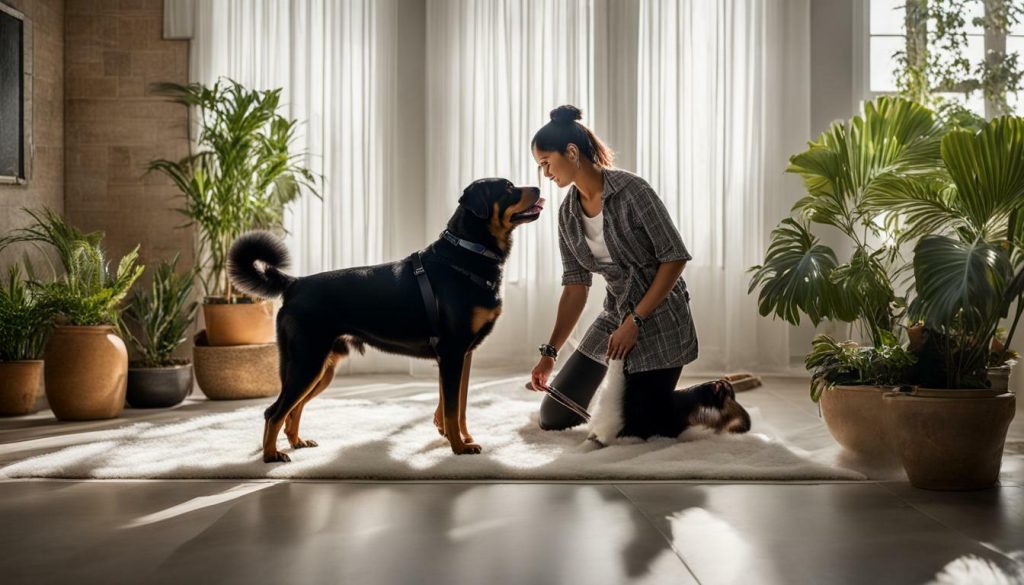
To maintain good hygiene, both breeds need regular nail trims, ear cleanings, and dental care. It’s important to check their ears regularly for signs of infection or excess wax buildup. Trim their nails every few weeks to prevent them from becoming overgrown and causing discomfort. Regular teeth brushing or providing dental chews can help prevent dental diseases.
Grooming can be a bonding experience between you and your dog. It allows you to check for any abnormalities or changes in their skin, fur, or overall health. Remember to use positive reinforcement and make grooming sessions enjoyable for your furry friend.
| Grooming Needs | Husky | Rottweiler |
|---|---|---|
| Coat Type | Double coat | Single coat |
| Brushing Frequency | At least once a week, more during shedding seasons | Once or twice a week |
| Shedding | Heavy shedding twice a year | Moderate shedding throughout the year |
| Other Grooming Needs | Nail trims, ear cleanings, dental care | Nail trims, ear cleanings, dental care |
Choosing the Perfect Pet
Armed with a comprehensive understanding of the characteristics, compatibility, and care needs of Huskies and Rottweilers, you can now make an informed decision to find your ideal canine companion. When considering which breed is right for you, it’s important to assess your own personality and lifestyle to ensure compatibility.
For those who lead an active and adventurous lifestyle, Huskies may be the perfect match. With their energetic nature and love for the outdoors, they thrive in an environment that provides ample exercise and mental stimulation. Their playful and sociable temperament makes them great family pets, but they do require consistent training and socialization from an early age.
On the other hand, if you’re looking for a loyal and protective companion, Rottweilers may be the ideal choice. With their natural guarding instincts and strong loyalty, they make excellent family pets and are known for their devotion to their owners. However, it’s important to note that Rottweilers require firm and consistent training to ensure they become well-behaved and obedient members of the family.
Ultimately, the decision between a Husky and a Rottweiler comes down to your lifestyle, preferences, and the type of relationship you want to build with your canine companion. Remember, individual dogs within each breed can also vary in terms of temperament and behavior, so it’s essential to spend time with the specific dog you’re considering before making a final decision. Exploring adoption options from rescue groups is a great way to find your ideal match and give a deserving dog a forever home.

In conclusion, choosing the perfect pet involves carefully considering your own characteristics, compatibility, and care needs, as well as those of the breed you’re considering. Whether you lean towards the spirited and adventurous nature of a Husky or the loyal and protective traits of a Rottweiler, remember that the bond between a pet and their owner goes beyond breed stereotypes. Take the time to meet different dogs, assess compatibility, and embrace the joy of finding your ideal canine companion.
Conclusion: Your Perfect Pet Match
While comparing Huskies and Rottweilers can guide you in finding your perfect pet match, remember that each dog is unique, and adopting from rescue groups can provide you with a loving companion that fits your lifestyle perfectly.
When considering compatibility, it’s important to take into account your personality, lifestyle, and specific needs. While zodiac signs can be a fun way to find a breed that aligns with your traits, it’s crucial to remember that individual dogs within each breed can vary in temperament and behavior.
Adopting from rescue groups not only gives you the opportunity to provide a forever home to a deserving pup, but it also allows you to learn more about the dog’s personality and history, ensuring a better match for both of you. Rescue groups can provide valuable insights into each dog’s needs, preferences, and compatibility with your family and home environment.
By adopting from rescue groups, you not only give a second chance to a loving dog in need but also open the door to a fulfilling relationship that can bring joy and companionship to your life. So, before making a decision, consider visiting local shelters and rescue organizations to find your perfect pet match.
FAQ
Q: How do I choose between a Husky and a Rottweiler as a pet?
A: When choosing between a Husky and a Rottweiler, it’s important to consider their characteristics, compatibility with your lifestyle, and care needs. Take into account factors such as temperament, size, exercise requirements, training and socialization needs, and grooming and maintenance requirements to make an informed decision.
Q: What are the characteristics of Huskies?
A: Huskies are known for their energetic and sociable temperament. They require regular exercise, have a strong prey drive, and have a double coat that requires regular grooming to manage shedding.
Q: What are the characteristics of Rottweilers?
A: Rottweilers are loyal and protective dogs. They have a calm demeanor and require consistent training and socialization. They have a short coat that requires minimal grooming but do shed moderately.
Q: How do Huskies and Rottweilers differ in temperament and personality?
A: Huskies are energetic and sociable, while Rottweilers are loyal and protective. Huskies may require more socialization and exercise to prevent boredom and destructive behaviors. Rottweilers are generally more reserved but form strong bonds with their families.
Q: What are the size and exercise requirements of Huskies and Rottweilers?
A: Huskies are medium-sized dogs with high exercise needs. They require daily exercise and ample space to run and play. Rottweilers are large-sized dogs with moderate exercise needs. Regular walks and playtime are sufficient to meet their exercise requirements.
Q: How should I train and socialize Huskies and Rottweilers?
A: Both Huskies and Rottweilers benefit from early training and socialization. Positive reinforcement techniques and consistency are key to successful training. Huskies may require extra attention to prevent stubbornness, while Rottweilers may need a firm yet gentle approach due to their protective nature.
Q: What are the grooming and maintenance requirements for Huskies and Rottweilers?
A: Huskies have a thick double coat that requires regular brushing to manage shedding. Rottweilers have a short coat that requires minimal grooming. Both breeds benefit from regular nail trimming, teeth cleaning, and ear cleaning.
Q: How do I choose the perfect pet between a Husky and a Rottweiler?
A: To choose the perfect pet, consider the characteristics, compatibility, and care needs of both breeds. Assess your lifestyle, living space, and ability to meet their exercise and grooming requirements. Ultimately, the decision should be based on finding a canine companion that fits well with your personality and lifestyle.
Q: Can I adopt a Husky or Rottweiler from a rescue group?
A: Yes, adopting from rescue groups is a great option. There are often Huskies and Rottweilers in need of loving homes. Contact local rescue organizations or check online adoption platforms to find these breeds and give them a second chance.
